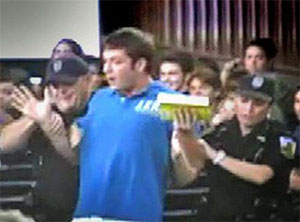 |
| A University of Florida student is led away and tasered after attempting to ask John Kerry a question at a town-hall forum. |
2007 – Year of the Taser?
It sure seems that way. Several troubling incidents involving the use of Tasers by police officers and security guards this past year have led to widespread concern across North America. An unruly questioner attending a John Kerry lecture at the University of Florida tasered by campus security, infamously yelling, “Don’t tase me, bro!” A Utah highway patrol officer tasering a man after he refused to sign a speeding ticket, captured for posterity on YouTube. A Polish immigrant killed at Vancouver International Airport after being shocked with a Taser by RCMP.
This past week, questions about the use of stun guns hit home with the tragic death of Howard Hyde.¬ÝA diagnosed schizophrenic, Mr. Hyde was tasered by Halifax Regional Police after becoming agitated and unruly while being booked for assault charges. Thirty hours later, he was found dead in his cell at a Dartmouth correctional facility, although some medical experts have cast doubt on whether the Taser was a direct factor in his death.
|
“When we’re thinking about reviewing practices and procedures, it’s not just about Tasers – the whole approach needs to be reviewed,” she explains.
Dr. Hughes, a former vice-president of the Canadian Mental Health Association, says that she’s concerned police forces are coming to see the stun gun as an easy way to gain control of unstable situations, but in doing so are neglecting less-violent approaches to conflict resolution.
“There are ways to work with someone who is upset that can deescalate the situation in much more effective ways than the use of physical force,” she says, naming non-threatening body movements, limiting the number of officers interacting with a suspect, and using calm and concerned language as key techniques. She also emphasizes that people with mental illness are no more likely to act out than anyone else – just about anyone could find themselves distraught in a tense situation.
Dr. Hughes believes that police officers would benefit from specific training and policies in dealing with mental health patients, but more importantly need to think beyond the immediate situation to the long-term implications of their actions.
“Evidence shows that an individual who encounters someone in authority who takes sharp control of a situation will be unlikely to trust that authority the next time because they’re afraid,” she explains. “It’s important that people who are going to be in a position to encounter distraught persons in their work be properly trained – corrections officers, health care workers, police workers, across the board.”
SEE: Ã˝¥•
